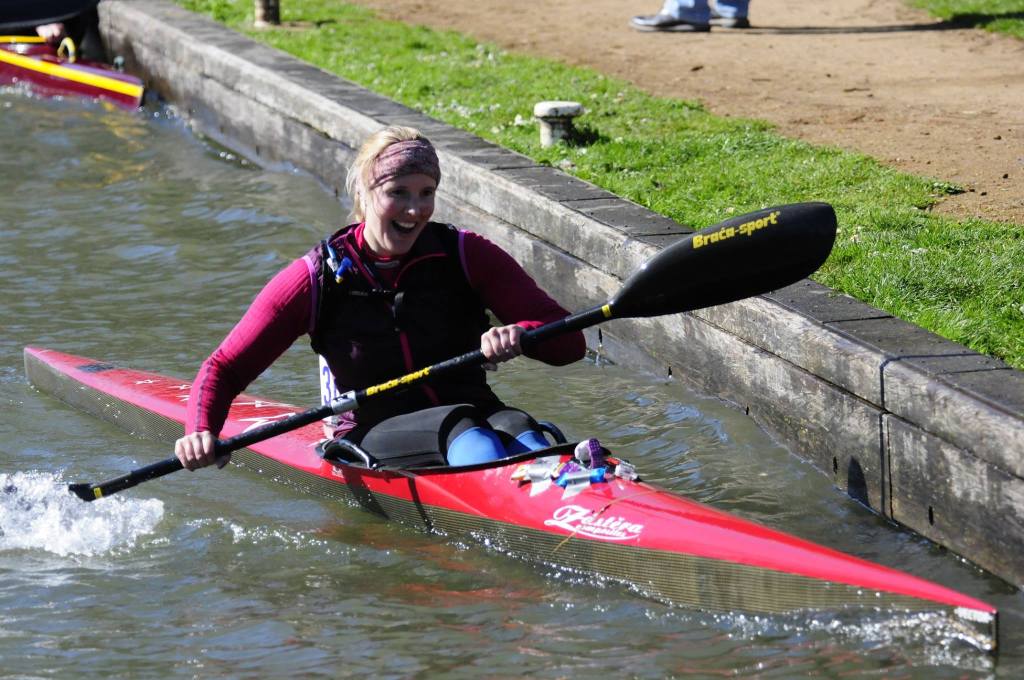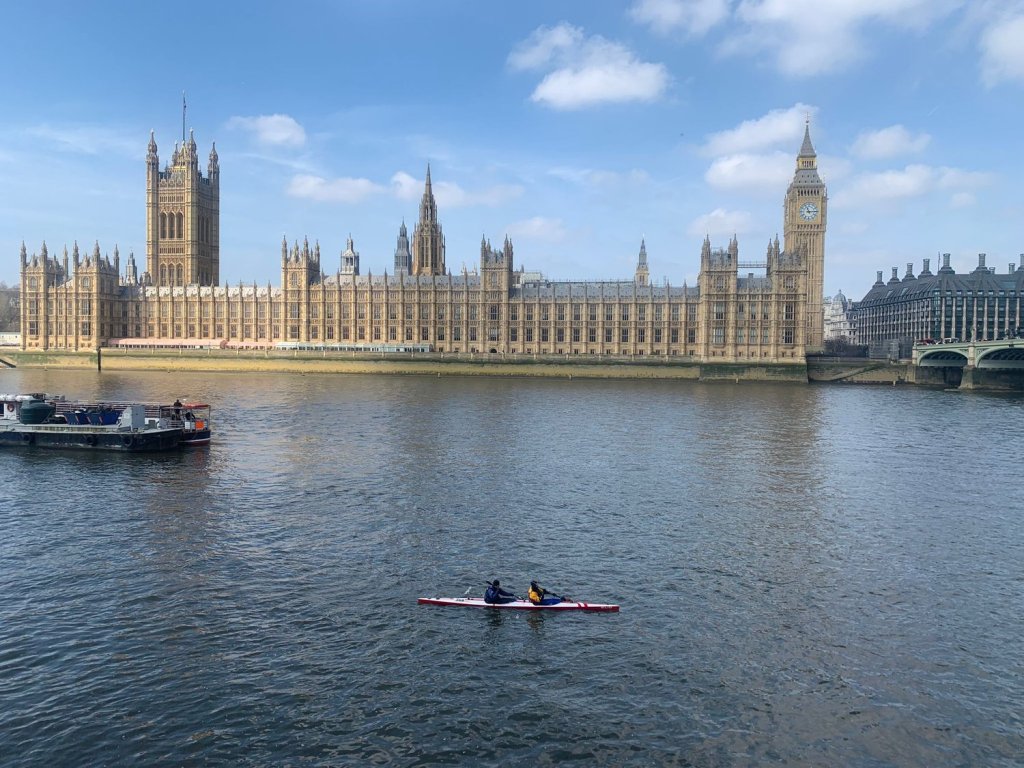Over the last few weeks, race fans’ Facebook groups have been filled with anxiety about whether DW 2024 will run or not. The organising committee issued dire warnings on the future of the race and likelihood of a Westminster finish:
“We are just not able to give that certainty at this point. The knock-on effect is that unless the entry numbers increase significantly, DW 2024 will not be financially viable.” (28 February Statement)
Paddlers responded quickly and entries flooded in, but remained short of the mark:
“We are a way off [the minimum 100 Senior Doubles crew entries needed], and it seems that we are unlikely to get there. The financial situation of the Organisation means that we cannot run the 2024 DW at a significant loss.” (8 March Statement)
While the DW organisers offered alternative solutions like ending both the stages race and Senior Doubles race at Thames Young Mariners (TYM) instead of Westminster, a few intrepid Westminster-bound paddlers decided to take things into their own hands.
Friends (of DW)
Kat Wilson (née Burbeck), a nine-time DW paddler, holder of the women’s k2 record, author of the annual “runners and riders” predictions, and 3rd fastest finisher in Senior Doubles last year, led the charge: “After the statement on the 8th, there was a lot of stress in the community. People were posting on Facebook wanting to help, but they weren’t sure what the problem was, the scale of it, or what exactly they could do.” Owen Peake and Billy Butler both reached out to Kat.
Kat Wilson pulling into a portage looking like she’s having the absolute time of her life. In Billy Butler’s words: “She has literally been the fairy godmother [of DW].”
Photo credit: Fred Taylor // Facebook

Wilson sprang into action, merging various conversations into a single WhatsApp chat that Tom Sharpe started with Owen, Billy, and a core group that became ‘Friends of DW’: “We were on WhatsApp at 8am, by 12pm we were on a Zoom meeting.” A few passionate senior paddlers offered their skills: Chloe Dobbs, Doug Herbert, Billy Butler, Tom Sharpe, Anoushka Freeman, and of course Kat Wilson. Race Director Paul Fielden and Owen Peake from the DW committee outlined the problem, and everyone got to work.
The one where they raise £25,000 in five days
The ‘Friends’ started making calls, posting to Facebook, and reaching out to clubs and organisations. Within just a few days, the response was overwhelming. About 200 people and organisations donated to raise £25,000 of the required £30,000 needed for a Westminster finish. Small and large donations came from enthusiastic individuals, canoe clubs and the wider paddling community. Kat noted: “British Canoeing (now Paddle UK) and the Marathon Racing Committee have been very generous. They want to see the race succeed because of the positive benefits it has on young paddlers and bringing young paddlers into the sport.” The DW community is more than just paddlers: “The Devizes community are engaging for the local race that they love. Our military community have also been really supportive.”
But most donations are just friends and family of the race who’ve done it or are planning to do it. More than 200 comments on Facebook showed just how much the race means to so many people sharing sentiments like “long live DW and the Easter madness.” Race fans also donated in honour of beloved friends and DW racers who’ve since passed, including James Smythe.
The one where they look at spreadsheets
With the funds raised, paddlers everywhere will be happy to know that (barring any further unforeseen events), the Senior Doubles race looks like it will be finishing at Westminster. Per the official race statement: “we are increasingly confident it will be Westminster (subject to river conditions).” Not only do the funds raised secure the finances needed for 2024, but it puts the race in a stronger position for next year. That said, the net financial picture for 2024 even including the £25k income will still be negative due to low entries and high costs. The organisers are ready to find a new funding approach:
…It’s pretty obvious that we need to look at a different financial model for the future. Entry numbers have been on a downward trend since 2019 whereas costs have steadily risen (some by as much as 50%). Safety costs for the tideway have gone up five fold. We don’t see entry fees for 2025 of £600 or more being too palatable. We recognise the feeling the DW Community has for the race as well as our obligation to safeguard the future of the DW for the paddlers of tomorrow. We fully understand that the magnificent fundraising effort of the last week cannot, nor should not, be repeated every year. Therefore, we will be reviewing the options for how to finance the race going forwards.
14 March Statement
DW is not the only big “ultra” paddling race struggling with finances. The organisers of the Texas Water Safari are also facing financial difficulties related to inflation and the disruption from COVID:
The last two years since Covid, inflation and supply chain issues have triggered a substantial increase in expenses. The TWS also needs to budget in the price increases for unexpected expenses such as legal fees, trademark protection, insurance, website design, a new tracking system for racers, race postponements, etc. The last time the Texas Water Safari had an entry fee increase was in 2018. The following information shows that the current entry fees do not cover the cost of the Texas River Marathon.
Texas Water Safari

The financial history of the Texas Water Safari shows loss after loss when excluding funds from sponsors and donors.
Some of the biggest paddling “ultras” are struggling with more than inflation and low entries. Financial mismanagement made the news when La Classique internationale de canots de la Mauricie, one of the three races in the American/Canadian Triple Crown of Canoe Racing, announced bankruptcy last year. While paddlers looked for solutions to host a similar alternative race, the government recognised just how important the race in and announced they would step in to save the Classique.
DW organisers say they’re considering various options to fund the future of the race, including sponsorship. Several comments on social media have also suggested that race entries may increase if the race were opened up to more types of craft like SUP and surfski. SUP has exploded in popularity in recent years, and has its own fast-growing culture of ultra racing at SUP-only events like Last Paddler Standing and SUP 11 City Tour as well as through the SUP class at craft-agnostic races like the Yukon River Quest and Great Alabama 650 which just had its first SUP finisher last year (after several years of SUP attempts). John Knippers from Langley, OK, USA covered 650 miles in 8 days and 8 hours. Surfski is not only growing in popularity, but also offers a more comfortable and safe option to paddlers worried about the hairy conditions of the Tideway. Both SUP and surfski craft would be difficult on portages. But opening up race entries to these craft could create just the impetus needed for a bit of innovation in craft carry-ability (portagability? ease-of-carrying?). A post in the DW Facebook group with a similar suggest last year sparked hot debate.

Chris Davison portages with a SUP on his way to being the first SUP to complete the Cheshire Ring Race. In his words: “The portages (unloading, carefully lift out board, walk round the lock, board back in, reload – repeat) were really time and energy sapping.”
Photo credit: John Kavanagh // Facebook
More innovative portaging techniques could include shoulder straps or wheels. But to be fair to Chris Davison’s experience in SUP – portages are also time and energy sapping in most types of craft!
The one where they finish at Westminster
The Westminster finish is the largest line item of race costs, coming in about £30,000. A survey showed that 75% of last year’s racers, supporters, and volunteers thought the Westminster finish cost was less than £25,000.

Other than being in the name of the race, why is it so important to finish at Westminster?
In the same survey, 65% of participants rated the Westminster finish as “essential” to the race. Many respondents described the finish as “iconic” despite the costs and challenges of paddling on the Tideway. Billy Butler said simply “The race runs to Westminster. The Westminster finish is a pain in the ass, but it is the race.”

Kat Wilson was more poetic: “The last 20km is the worst part of the race. You get on the tideway and it’s just a real mental slog. The river gets wider and wider, and you get smaller and smaller and realise your insignificance in this vast river. It’s wild to think you’re a tiny person who’s paddled all the way from this little town in the West Country and found yourself in Central London. A couple of times, I’ve finished as Big Ben was chiming. Pretty epic, right?”
Aside from the epicness of the finish, having the Tideway at the end of DW adds a unique element of tidal planning that few (if any) other races require. A good crew will arrive at Teddington Lock within the required window where the tide is flowing toward central London. A great crew will stick to their schedule precisely and get on the Tideway just in time to catch the fastest flow all the way to Westminster. In Kat’s words: “It tests whether you scheduled correctly.”
Friends (of DW) Season 2?
Despite the impressive fundraising efforts by the Friends of DW this year, the future of DW in 2025 and beyond remains unclear. The organisers are welcoming new ideas, saying “They will all be considered. We are delighted that people have already come forwards and offered to help the organisation with this review and subsequent action plan once we get past Easter. If you feel you would also like to contribute to this effort, please get in touch.” Whether the solution involves new sponsors, new craft classes, higher entry fees, or Billy Butler’s out-of-the-box idea to get Bear Grylls and Steve Backshall to do DW with a couple Scouts, the race will undoubtedly need to change to survive. In Billy’s words: “If people fall back in love with the race this year, it will thrive. And if DW is on your bucket list, go out and get it done.”

Billy Butler with his future K2 partner, Bear Grylls. Here, Bear has borrowed his kit from Jon O’Grady. If they run out of water during the race, Bear has offered some ideas for alternative methods of hydration, but Billy is sceptical.

Leave a comment